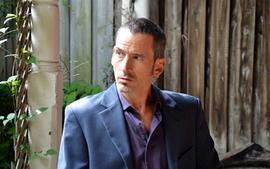 |
|
| Steven Heighton | |
Award-winning poet and writer Steven Heighton, who over his decades-long career published 19 books, died April 19, Quill & Quire reported. He was 60. Heighton won a Governor General's Literary Award for his 2016 collection The Waking Comes Late, but his published works spanned genres, including several novels, a children's book, a memoir, essays and a story collection. His most recent published book was last year's Selected Poems, 1983-2020.
In a statement, House of Anansi, which published his poetry as well as his children's book (at Groundwood), said: "We received the news of Steven Heighton's passing with great sadness and send our deepest condolences to his loved ones.... We are honored that so many of us had the opportunity to know Steven and interact with his writing.... Steven was a prolific and prize-winning author, poet and musician. He was also a kind friend and a true talent. He will be so missed." His other publishers Penguin Random House, Biblioasis and Palimpsest Press shared their condolences on social media, CBC reported.
Heighton published six books of poetry, debuting in 1989 with Stalin's Carnival, which won the Gerald Lampert Award for best first collection, and was followed by The Ecstasy of Skeptics (1994). His first book of short fiction, Flight Paths of the Emperor, was a finalist for the Trillium Award. He later published the memoir Reaching Mithymna, a finalist for the 2020 Hilary Weston Writers' Trust Prize for Nonfiction. Other works include poetry titles The Address Book and Patient Frame; as well as novels The Shadow Boxer, Afterlands and The Nightingale Won't Let You Sleep.
The Writers Trust of Canada noted: "The world has lost great Canadian novelist, poet, nonfiction writer and singer Steven Heighton (1961-2022), who had 'poetic sensibilities and storytelling skills with a documentarian's eye.' "
In a tribute, Biblioasis publisher Dan Wells wrote: "Steven Heighton made us better, as publishers, as people. I can see from the tributes that have met his passing we're far from alone in this. He challenged and encouraged in equal measure, almost always getting the balance right. In this age of ironic detachment he risked being earnest, vulnerable, showing care and concern; 'hardened against carious/ words, spurious charms,' there was about him nothing counterfeit; he worked and worried about making the world a better place to be; worried about how he, and all of us, should move through it. And, damn it, is he going to be missed."

